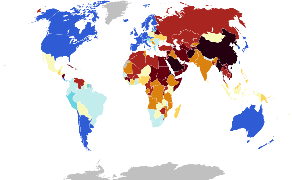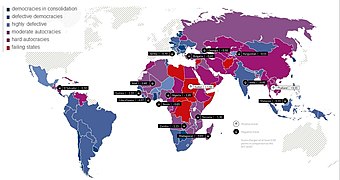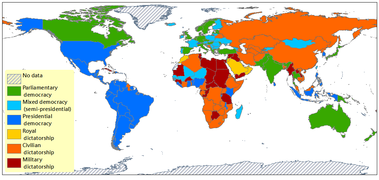Democracy indices are quantitative and comparative assessments of the state of democracy for different countries according to various definitions of democracy.
The democracy indices differ in whether they are categorical, such as classifying countries into democracies, hybrid regimes, and autocracies, or continuous values. The qualitative nature of democracy indices enables data analytical approaches for studying causal mechanisms of regime transformation processes.
Democracy indices vary in their scope and the weight assigned to different aspects of democracy. These aspects include the breadth and strength of core democratic institutions, the competitiveness and inclusiveness of polyarchy, freedom of expression, governance quality, adherence to democratic norms, co-option of opposition, and other related factors.electoral system manipulation, electoral fraud, and popular support of anti-democratic alternatives.
Prominent democracy indices
Operating
- The Economist Democracy Index, by the UK-based Economist Intelligence Unit, is an assessment of countries' democracy. Countries are rated as full democracies, flawed democracies, hybrid regimes, or authoritarian regimes. The index is based on five categories measuring pluralism, civil liberties, and political culture.
- V-Dem Democracy indices by the V-Dem Institute distinguishes between five high-level principles of democracy: electoral, liberal, participatory, deliberative, and egalitarian, and quantifies these principles. The V-Dem Democracy indices include the Citizen-initiated component of direct popular vote index, which indicates the strength of direct democracy and the presidentialism index, which indicates higher concentration of political power in the hands of one individual.
- Bertelsmann Transformation Index by the Bertelsmann Stiftung evaluates the development status and governance of political and economic transformation processes on the path to constitutional democracy and a market economy for developing and transition countries around the world. Bertelsmann Transformation Index categorizes countries into: hard-line autocracy, moderate autocracy, very defective democracy, defective democracy, and consolidating democracy.
- The Global State of Democracy Indices by International Institute for Democracy and Electoral Assistance assesses democratic performance using different types of sources: expert surveys, standards-based coding by research groups and analysts, observational data and composite measures.
- The Democracy Perception Index, published annually by the Alliance of Democracies, is the world's largest annual survey on how people perceive the state of democracy (cf. the Corruption Perceptions Index which similarly seeks to measure public perception).
Indices measuring aspects of democracy
- Freedom in the World, is a yearly survey and report by the U.S.-based non-governmental organization Freedom House that measures the degree of civil liberties and political rights in every nation and significant related and disputed territories around the world.
- Effective number of parties is an index of the adjusted number of political parties in a country's party system.
- Electoral Integrity Project surveys academics on the perceived electoral integrity of countries and subnational entities
- Fragile States Index, formerly the Failed States Index, is an annual report that aims to assess states'The assessment ranks all sovereign states with United Nations membership, provided sufficient data is available for analysis, based on their vulnerability to conflict or collapse..
- Gallagher index measures an electoral system's relative disproportionality between votes received and seats in a legislature.
- The Pedersen index is a measure of political volatility in party systems.
Other measured aspects of democracy include voter turnout, efficiency gap, wasted vote, and political efficacy.
Historical
- Democracy-Dictatorship Index is a binary measure of democracy and dictatorship.
- Democracy Ranking is a democracy ranking by the Association for Development and Advancement of the Democracy Award.
- Polity data series contains annual information on regime authority characteristics and covers the years 1800–2018 based on competitiveness, openness, and level of participation, sponsored by the Political Instability Task Force (PITF).
- Boix-Miller-Rosato dichotomous coding of democracy, easy-to-observe characteristics, few evaluations by own researchers based on academic literature. As a classification: non-democracy to democracy.
- Lexical Index of Electoral Democracy (LIED) by Skaaning et al. democracy's characteristics assessed with easy-to-observe characteristics, few evaluations by own researchers based on academic research, and evaluating whether necessary characteristics are present.
- The Index of Democratization created by Tatu Vanhanen.
Maps of indices
Further information: Democratic backsliding by country-
 V-Dem Electoral Democracy Index in 2023
V-Dem Electoral Democracy Index in 2023
-
 The 2023 The Economist Democracy Index map
The 2023 The Economist Democracy Index map
-
 Global trend report analyzes the results of the Bertelsmann Transformation Index 2022.
Global trend report analyzes the results of the Bertelsmann Transformation Index 2022.
-
 Country ratings from Freedom House's Freedom in the World survey for 2022
Country ratings from Freedom House's Freedom in the World survey for 2022
-
 Democracy-Dictatorship Index in 2008
Democracy-Dictatorship Index in 2008
-
 Fragile States Index 2005–2013
Fragile States Index 2005–2013
Difficulties in measuring democracy
Democracy is a multifaceted concept encompassing the functioning of diverse institutions, many of which are challenging to measure. As a result, limitations arise in quantifying and econometrically analyzing democracy's potential effects or its relationships with other phenomena, such as inequality, poverty, and education. etc. Given the challenges of obtaining reliable data on within-country variations in aspects of democracy, much of the academic focus has been on cross-country comparisons. However, significant variations in democratic institutions can exist within individual countries, highlighting the limitations of such an approach. Another dimension of the difficulty in measuring democracy lies in the ongoing debate between minimalist and maximalist definitions of democracy. A minimalist conception of democracy defines democracy by primarily considering the essence of democracy; such as electoral procedures. A maximalist definition of democracy can include outcomes, such as economic or administrative efficiency, into measures of democracy. Some aspects of democracy, such as responsiveness or accountability, are generally not included in democracy indices due to the difficulty measuring these aspects. Other aspects, such as judicial independence or quality of the electoral system, are included in some democracy indices but not in others.
Some measures of democracy, such as Freedom House and Polity IV, adopt a maximalist understanding of democracy by analyzing indicators that extend beyond mere electoral procedures. These measures aim to capture broader dimensions of democratic governance, reflecting a more comprehensive view of political systems.." The Journal of Politics. 70 (3): 632–647.</ref> These measures attempt to gauge contestation and inclusion; two features Robert Dahl argued are essential in democracies that successfully promote accountable governments. The democratic rating given by these mainstream measures can vary greatly depending on the indicators and evidence they deploy. The definition of democracy utilized by these measures is important because of the discouraging and alienating power such ratings can have, particularly when determined by indicators which are biased toward Western democracies.
Dieter Fuchs and Edeltraud Roller argue that accurately measuring the quality of democracy requires complementing objective metrics with subjective measurements that reflect the perspectives and experiences of citizens.. Similarly, Quinton Mayne and Brigitte Geißel also defend that the quality of democracy does not depend exclusively on the performance of institutions, but also on the citizens' own dispositions and commitment.
Critiques of measures of democracy
Data on democracy, and particularly global indices of democracy, and the data they rely on, have been the subject of scrutiny and criticized by various scholars. Gerardo L. Munck and Jay Verkuilen for instance, have raised concerns about the methodologies used by prominent democracy indices such as Freedom House and Polity.Such as the concept of democracy they measured, the design of indicators, and the aggregation rule. Political scientists Andrew T. Little and Anne Meng "highlight measurement concerns regarding time-varying bias in expert-coded data" such as Freedom House and V-Dem and encourage improving expert-coding practices. Knutsen et al. did not see evidence for time-varying bias in their expert-coded data and note the application of item response theory, factor analysis and estimates of uncertainties to limit expert biases while discussing concerns in operationalization of observer-invariant measures of democracy.
See also
- Corruption Perception Index
- Democratic transition
- Types of democracy
- List of international rankings
- List of freedom indices
- List of globalization-related indices
- List of countries by system of government
- List of forms of government
References
- Geissel, Brigitte; Kneuer, Marianne; Lauth, Hans-Joachim (2016). "Measuring the quality of democracy: Introduction". International Political Science Review. 37 (5). Sage Publications: 571–579. doi:10.1177/0192512116669141. ISSN 0192-5121. JSTOR 26556872. S2CID 151808737. Retrieved 2023-04-03.
- Greenwood, Shannon (2022-12-06). "Appendix A: Classifying democracies". Pew Research Center's Global Attitudes Project. Retrieved 2022-12-27.
- Dobratz, B. A. (2015). Power, Politics, and Society: An Introduction to Political Sociology. Taylor & Francis. p. 47. ISBN 978-1-317-34529-9. Retrieved Apr 30, 2023.
- Michie, J. (2014). Reader's Guide to the Social Sciences. Taylor & Francis. pp. 95–97. ISBN 978-1-135-93226-8. Retrieved 2023-04-03.
- "Democracy data: how do researchers measure democracy?". Our World in Data. Jun 17, 2022. Retrieved Apr 17, 2023.
- "The 'Varieties of Democracy' data: how do researchers measure democracy?". Our World in Data. 2022-11-30. Retrieved 2023-04-03.
- "Breaking Down Democracy". Freedom House. Retrieved 2023-04-03.
- "Democracy and Autocracy, Why do Democracies Develop and Decline", Vol. 21(1) June 2023, Democracy and Autocracy Section, American Political Science Association.
- "Democracy Index 2021: the China challenge". Economist Intelligence Unit.
- "Democracy Report 2022: Autocratization Changing Nature?" (PDF), V-Dem Institute, University of Gothenburg.
- "Governance Report". BTI 2022. Retrieved Apr 17, 2023.
- "The Global State of Democracy Indices". International Institute for Democracy and Electoral Assistance. Retrieved May 26, 2023.
- "Democracy Perception Index – Alliance of Democracies".
- Ide, William (11 January 2000). "Freedom House Report: Asia Sees Some Significant Progress". Voice of America. Archived from the original on 4 December 2013. Retrieved October 13, 2012.
- "Freedom in the World". Freedom House. 2021-02-01. Retrieved 2023-04-03.
- Laakso, Markku; Taagepera, Rein (1979). "'Effective' Number of Parties: A Measure with Application to West Europe". Comparative Political Studies. 12 (1): 3–27. doi:10.1177/001041407901200101. ISSN 0010-4140. S2CID 143250203.
- "Failed States FAQ". Fund for Peace. Archived from the original on 2010-11-18. Retrieved 2007-08-25.
- "The Gallagher Index". iscanadafair.ca. Retrieved Apr 3, 2023.
- Karp, Jeffrey A.; Banducci, Susan A. (2008). "Political Efficacy and Participation in Twenty-Seven Democracies: How Electoral Systems Shape Political Behaviour". British Journal of Political Science. 38 (2). Cambridge University Press: 311–334. doi:10.1017/S0007123408000161. hdl:10036/64393. ISSN 0007-1234. JSTOR 27568347. S2CID 55486399. Retrieved 2023-06-16.
- "Internal and external political efficacy – Government at a Glance 2021". OECD iLibrary. Retrieved 2023-06-16.
- "Democracy-Dictatorship_Index". Kaggle. Jul 17, 2020. Retrieved Apr 3, 2023.
- "Home". Democracy Ranking (in German). Feb 12, 2017. Retrieved Apr 3, 2023.
- "Polity IV Project". Table footnote. Archived from the original on 4 May 2020. Retrieved 11 Jan 2020.
- "Boix-Miller-Rosato dichotomous coding of democracy, 1800–2020, version 4.0 – bmr". xmarquez.github.io. Retrieved April 17, 2023.
- Skaaning, Svend-Erik; Gerring, John; Bartusevičius, Henrikas (Apr 26, 2015). "A Lexical Index of Electoral Democracy" (PDF). Comparative Political Studies. 48 (12). Sage Publications: 1491–1525. doi:10.1177/0010414015581050. ISSN 0010-4140. S2CID 16062427.
- Democracy Report 2023, Table 3, V-Dem Institute, 2023
- "Global Dashboard". BTI 2022. Retrieved Apr 17, 2023.
- Cheibub, José Antonio; Gandhi, Jennifer; Vreeland, James Raymond (April 2010). "Democracy and dictatorship revisited". Public Choice. 143 (1–2): 67–101. doi:10.1007/s11127-009-9491-2. JSTOR 40661005. S2CID 45234838.
- Krauss, Alexander (January 2, 2016). "The scientific limits of understanding the (potential) relationship between complex social phenomena: the case of democracy and inequality". Journal of Economic Methodology. 23 (1): 97–109. doi:10.1080/1350178X.2015.1069372. S2CID 51782149 – via CrossRef.
- Dahl, Robert A.; Ian Shapiro; José Antônio Cheibub; and Adam Przeworski. “Minimalist Conception of Democracy: A Defense.” Essay. In The Democracy Sourcebook, pp. 12–17. Cambridge: Massachusetts Institute of Technology Press, 2003.
- Schmitter, Philippe C. and Terry Lynn Karl. 1991. "What Democracy is.. . and is Not." Journal of Democracy 2 (3): 75–88
- Esaiasson, Peter; Wlezien, Christopher (2017). "Advances in the Study of Democratic Responsiveness: An Introduction". Comparative Political Studies. 50 (6): 699–710. doi:10.1177/0010414016633226.
- Samuels, David. “Chapter 3: Democratic Political Regimes.” Essay. In Comparative Politics. New York: Pearson Education, 2013.
- Clark, William Roberts; Matt Golder; and Sona Nadenichek Golder. “Chapter 5: Economic Determinates of Democracy.” Chapter. In Foundations of Comparative Politics, pp. 351–392.
- Högström, John (2013). "Does the Choice of Democracy Measure Matter? Comparisons between the Two Leading Democracy Indices, Freedom House and Polity IV". Government and Opposition. 48 (2): 201–221. doi:10.1017/gov.2012.10.
- Piironen, Ossi. 2005. "Minimalist Democracy without Substance? an Evaluation of the Mainstream Measures of Democracy." Politiikka. 47 (3): 189–204.
- Fuchs, Dieter; Roller, Edeltraud (2018). "Conceptualizing and Measuring the Quality of Democracy: The Citizens' Perspective". Politics and Governance. 6 (1): 22. doi:10.17645/pag.v6i1.1188.
- Mayne, Quinton; Geißel, Brigitte (2018). "Don't Good Democracies Need 'Good' Citizens? Citizen Dispositions and the Study of Democratic Quality". Politics and Governance. 6 (1): 33. doi:10.17645/pag.v6i1.1216.
- Gerardo L. Munck and Jay Verkuilen, “Conceptualizing and Measuring Democracy: Evaluating Alternative Indices,” Comparative Political Studies. 35, 1 (2002): 5–34. https://citeseerx.ist.psu.edu/viewdoc/download?doi=10.1.1.469.3177&rep=rep1&type=pdf.
- Little, Andrew T.; Meng, Anne (2024-01-11). "Measuring Democratic Backsliding". PS: Political Science & Politics. 57 (2): 149–161. doi:10.1017/S104909652300063X. ISSN 1049-0965.
- Knutsen, Carl Henrik; Marquardt, Kyle L.; Seim, Brigitte; Coppedge, Michael; Edgell, Amanda B.; Medzihorsky, Juraj; Pemstein, Daniel; Teorell, Jan; Gerring, John; Lindberg, Staffan I. (2024-01-11). "Conceptual and Measurement Issues in Assessing Democratic Backsliding". PS: Political Science & Politics. 57 (2): 162–177. doi:10.1017/S104909652300077X. ISSN 1049-0965.
Further reading
- Munck, G. L. (2009). Measuring Democracy: A Bridge between Scholarship and Politics. Democratic Transition and Consolidation. Johns Hopkins University Press. ISBN 978-0-8018-9650-7.
- Kahn, H. (2017). On Measuring Democracy: Its Consequences and Concomitants: Conference Papers. Taylor & Francis. ISBN 978-1-351-50205-4.
- Coppedge, Michael; Gerring, John; Altman, David; Bernhard, Michael; Fish, Steven; Hicken, Allen; Kroenig, Matthew; Lindberg, Staffan I.; McMann, Kelly; Paxton, Pamela; Semetko, Holli A.; Skaaning, Svend-Erik; Staton, Jeffrey; Teorell, Jan (2011). "Conceptualizing and Measuring Democracy: A New Approach". Perspectives on Politics. 9 (2). American Political Science Association, Cambridge University Press: 247–267. doi:10.1017/S1537592711000880. ISSN 1537-5927. JSTOR 41479651. S2CID 11629045.
- Croissant, Aurel; Pelke, Lars (2022-04-25). "Measuring Policy Performance, Democracy, and Governance Capacities: A conceptual and methodological assessment of the Sustainable Governance Indicators (SGI)". European Policy Analysis. 8 (2). Wiley: 136–159. doi:10.1002/epa2.1141. ISSN 2380-6567.
- Sönmez, Hakan (2020-09-30). "Democratic Backsliding or Stabilization?". Politikon: The IAPSS Journal of Political Science. 46. International Association for Political Science Students: 54–78. doi:10.22151/politikon.46.3. ISSN 2414-6633. S2CID 224846248.
External links
- Democracy data: how do researchers measure democracy? – Our World in Data
- How do you measure ‘democracy’? – The Washington Post
- Catalogue of Indices 2016 – Global Observatory